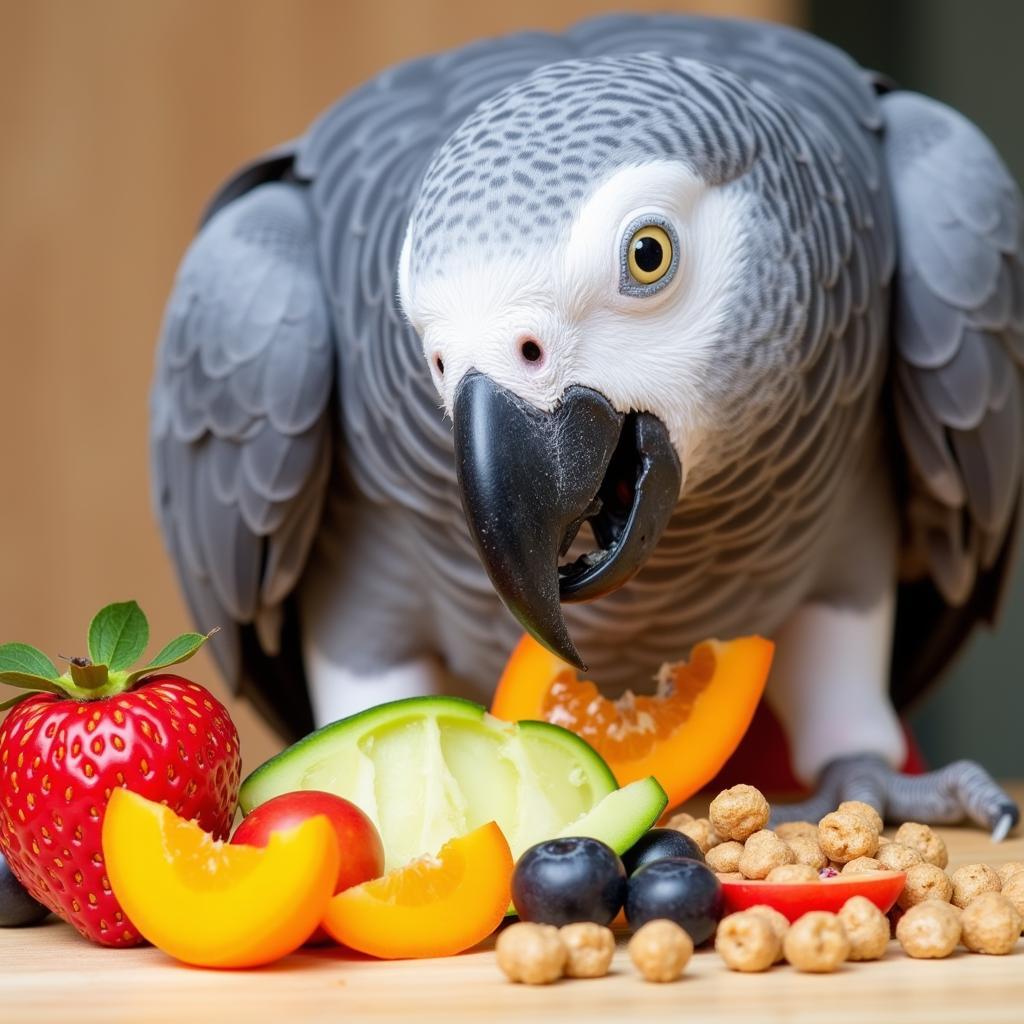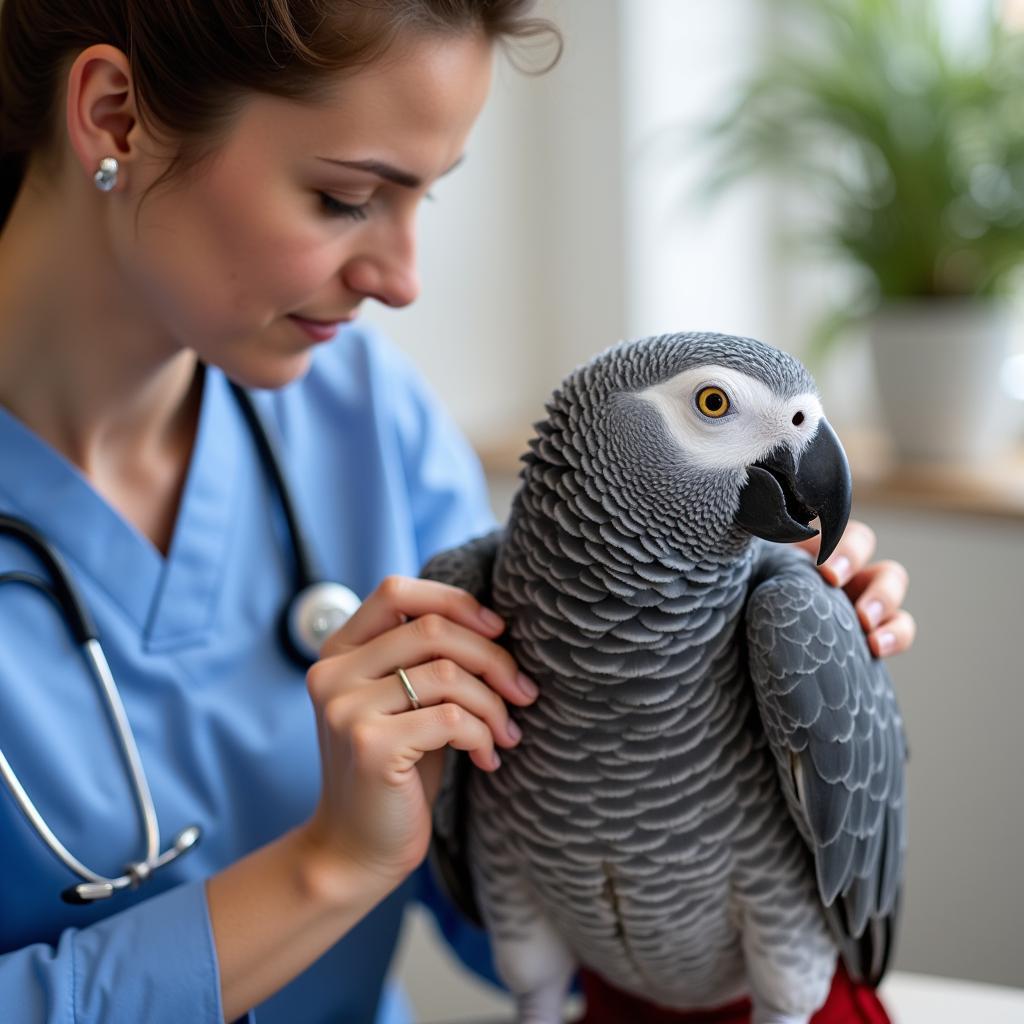African Grey Parrot Hair Fall: Causes, Prevention, and Solutions
African Grey Parrot Hair Fall can be a concerning sight for any owner. While some feather loss is natural, excessive shedding or bald patches can indicate underlying health issues or environmental factors. Understanding the reasons behind this phenomenon is crucial for ensuring your feathered friend’s well-being. This article will delve into the various causes of African grey parrot hair fall, offering practical prevention strategies and effective solutions.
Understanding Natural Molting vs. Problematic Hair Fall in African Greys
It’s essential to differentiate between normal molting and problematic hair fall. Molting is a natural process where old feathers are replaced with new ones. This typically occurs gradually and symmetrically, without causing bare spots. However, if you notice excessive feather loss, bald patches, or your parrot seems distressed, it’s time to investigate further. Is your parrot plucking its feathers? Is the skin irritated or inflamed? These are signs that the hair fall is not simply molting.
Dietary Deficiencies and Their Impact on Feather Health
A balanced diet is paramount for healthy feather growth. Deficiencies in essential vitamins and minerals, such as vitamin A, vitamin D3, and calcium, can lead to brittle feathers and increased hair fall. Seeds alone do not provide a complete diet for African greys. A varied diet rich in fruits, vegetables, and high-quality parrot pellets is crucial.
 African Grey Parrot Eating a Healthy Diet for Feather Growth
African Grey Parrot Eating a Healthy Diet for Feather Growth
Environmental Stressors and Their Role in Hair Fall
Environmental factors can significantly impact an African grey’s feather health. Low humidity, inadequate lighting, and even boredom can trigger stress-induced feather plucking or abnormal molting. Providing a stimulating environment with plenty of toys, social interaction, and natural sunlight (or full-spectrum lighting) is crucial.
Identifying and Addressing Underlying Medical Conditions
Underlying medical conditions, such as bacterial or fungal infections, parasitic infestations, hormonal imbalances, and even allergies, can manifest as feather loss. If you suspect a medical issue, consult an avian veterinarian immediately for proper diagnosis and treatment. Early intervention is key to preventing further complications.
 African Grey Parrot Undergoing a Veterinary Checkup for Feather Loss
African Grey Parrot Undergoing a Veterinary Checkup for Feather Loss
Preventing African Grey Parrot Hair Fall: Proactive Steps for a Healthy Plumage
Providing a nutritious diet, a stimulating environment, and regular veterinary checkups are the cornerstones of preventing hair fall in African greys. Offer a variety of fresh foods, ensure proper humidity levels, and provide opportunities for exercise and mental stimulation.
Creating a Stimulating Environment for Your African Grey
Enrichment activities, such as foraging toys, puzzle feeders, and interactive play sessions, can help reduce stress and prevent feather plucking. Consider providing a variety of perches with different textures and sizes to encourage natural foot exercise and prevent pressure sores, which can sometimes contribute to feather loss in specific areas.
The Importance of Regular Veterinary Checkups
Regular veterinary checkups are essential for early detection and treatment of any underlying health issues that could be contributing to hair fall. These checkups also provide an opportunity to discuss your parrot’s diet and environment and receive personalized advice on optimizing their feather health.
Effective Solutions for Addressing African Grey Parrot Hair Fall
If your African grey is experiencing excessive feather loss, consult an avian veterinarian to determine the underlying cause. Treatment will vary depending on the diagnosis, and may include dietary adjustments, medication, or environmental modifications.
Dietary Adjustments and Supplements for Feather Health
Supplementation with specific vitamins and minerals, such as vitamin A and biotin, may be recommended to support feather growth and overall health. However, it’s crucial to consult with a veterinarian before administering any supplements, as over-supplementation can be harmful.
Managing Stress and Promoting a Calm Environment
Creating a calm and predictable environment can help reduce stress and discourage feather plucking. Minimizing loud noises, sudden changes in routine, and overcrowding can significantly improve your parrot’s emotional well-being and feather health.
Conclusion: Ensuring a Healthy Plumage for Your African Grey Parrot
African grey parrot hair fall can be a complex issue with various underlying causes. By understanding the factors that contribute to feather loss, implementing preventative measures, and seeking professional guidance when needed, you can help your feathered companion maintain a healthy, vibrant plumage. Remember, a healthy coat is a reflection of a healthy bird.
FAQ
- How often do African greys molt?
- Typically, African greys molt once or twice a year.
- Is it normal for my African grey to lose some feathers?
- Some feather loss is normal during molting, but excessive shedding or bald patches should be investigated.
- What are the signs of stress in African greys?
- Signs of stress can include feather plucking, excessive vocalization, and changes in appetite.
- What should I feed my African grey for healthy feathers?
- A varied diet of fruits, vegetables, high-quality parrot pellets, and occasional healthy seeds is recommended.
- When should I take my African grey to the vet for feather loss?
- If you notice excessive shedding, bald patches, or any other concerning symptoms, consult an avian veterinarian.
- Can I give my parrot human vitamins for feather growth?
- No, do not give your parrot human vitamins. Always consult with a veterinarian for appropriate supplements.
- How can I create a stimulating environment for my African grey?
- Provide a variety of toys, foraging opportunities, and regular interaction to keep your parrot mentally and physically stimulated.
Scenarios of Common Questions:
Scenario 1: Your African grey is losing feathers around its neck. This could indicate feather plucking due to stress or boredom. Check their environment for stressors and consider adding more enrichment activities.
Scenario 2: Your African grey is losing feathers symmetrically on its wings and body. This is likely normal molting. Monitor for any unusual bare patches or signs of distress.
Further Reading and Resources:
For more information on African grey parrot care, please visit other articles on our website, such as “Understanding African Grey Parrot Behavior” and “Creating a Stimulating Environment for Your Parrot.”
Call to Action:
For personalized advice and support regarding your African grey parrot’s feather health, please contact us at Phone Number: +255768904061, Email: kaka.mag@gmail.com, or visit our office at Mbarali DC Mawindi, Kangaga, Tanzania. Our customer service team is available 24/7 to assist you.
